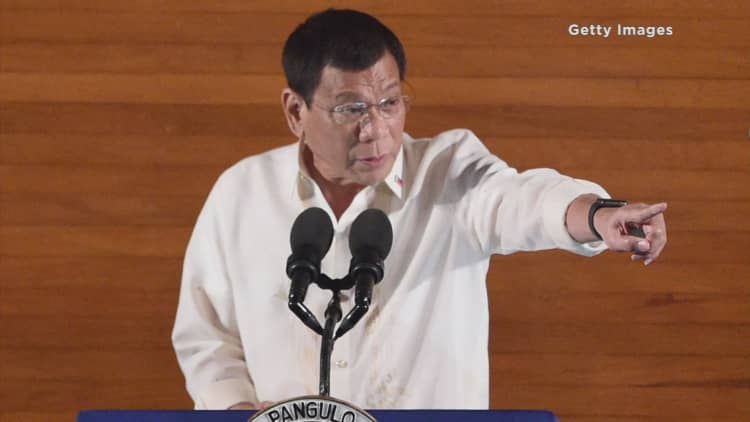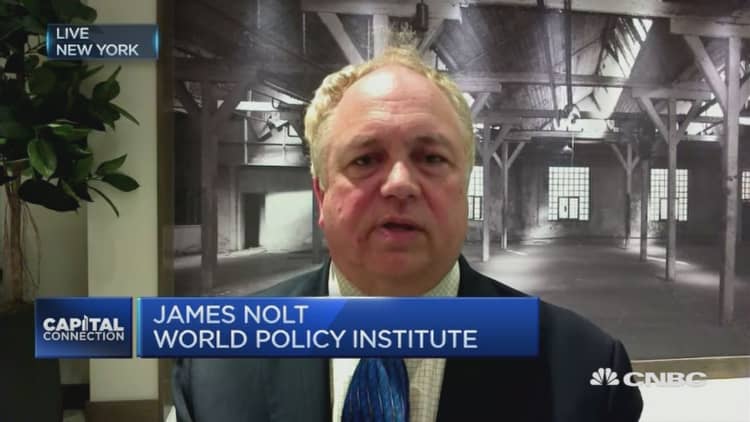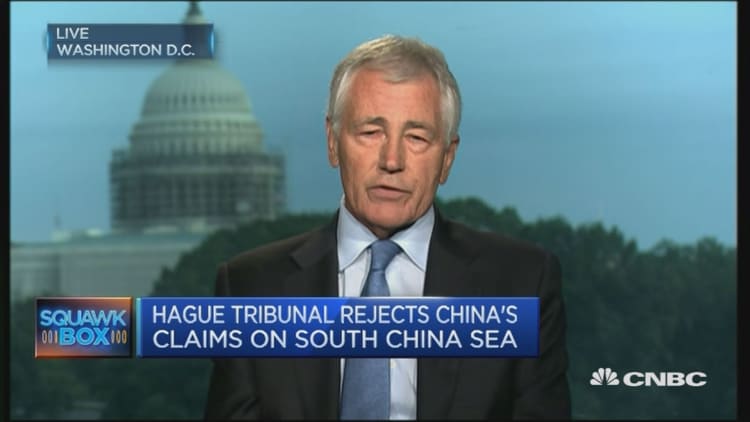
The Philippines "vigorously pushed" for the inclusion of a arbitration ruling in a joint statement among Southeast Asian countries but its failure to secure that was no diplomatic win for China, Manila's foreign minister said on Wednesday.
The Philippines had not sought support from the Association of Southeast Asian Nations (ASEAN) or the international community in its arbitration case against Beijing over the South China Sea, and did not want to press the issue to provoke China, Perfecto Yasay said.
Yasay was speaking after returning from a meeting of foreign ministers in Laos, during which ASEAN dropped a U.S.-backed proposal to mention the landmark July 12 court ruling, which nullified Beijing's claims to most of the South China Sea.
"I am just saying this to dispel the reports that have been said that China came out victorious in the ASEAN meeting because we precisely agreed to not mentioning the arbitral award," Yasay told a news conference.
"But that (was) not the object of our meeting in ASEAN. The arbitral award is a matter between China and the Philippines."
Yasay said the issuance of a joint communique was a victory for ASEAN, which was divided but showed it was united on the need to stick to international law and ensure peace.

The Philippines and Vietnam both wanted the ruling and a call to respect international maritime law to feature in the communique, but Cambodia rejected the wording on the ruling, diplomats said, backing instead China's call for bilateral discussions.
Manila backed down to prevent the disagreement leading to the group failing to issue a joint statement after a meeting for only the second time in its 49-year history. Yasay said the Philippines did not want to gloat over the win, or rock the boat with ASEAN.
Yasay also said he wanted China to take a position so that dialogue could happen but did not say whether the Philippines would insist that the arbitration ruling be discussed.
Yasay met with U.S. counterpart John Kerry on Wednesday in Manila, during which Yasay thanked him for Washington's support on the court decision.
Kerry meets with Philippine's President Rodrigo Duterte later on Wednesday and will discuss how to move ahead following the ruling, a U.S. official said.

Kerry said on Tuesday he supported the resumption of talks between China and the Philippines on the issue.
China did not participate in and has refused to accept the July 12 ruling by the Permanent Court of Arbitration, based in The Hague, in which U.S. ally Manila won an emphatic legal victory.
China's Foreign Minister Wang Yi had asked Kerry to lend his support for bilateral talks to restart between Manila and Beijing in a meeting between the two in the Laos capital of Vientiane on Monday.
"The foreign minister said the time has come to move away from public tensions and turn the page," Kerry told a news conference. "And we agree with that ... no claimant should be acting in a way that is provocative, no claimant should take steps that wind up raising tensions."
Duterte has already appointed former President Fidel Ramos to visit Beijing and begin informal talks to resolve the dispute, a Philippine Foreign Ministry official said on Tuesday.
The court ruling has exacerbated tensions between the 10 members of the Association of Southeast Asian Nations (ASEAN), which are pulled between their desire to assert their sovereignty while fostering ties with an increasingly assertive Beijing.

China appeared to score a diplomatic victory on Monday when ASEAN dropped any reference to the ruling from a joint statement at the end of the bloc's foreign ministers' meeting, in the face of resolute objections from Cambodia, China's closest ASEAN ally.
Yasay told reporters in Vientiane that the dispute was not between China and the United States but between China and the Philippines.
"We would like to pursue bilateral relationships in so far as the peaceful resolution of the dispute is concerned that is between the China and the Philippines. The others are not concerned with that dispute," Yasay told reporters.
Peace and stability
Wang, who met Kerry on the sidelines of the ASEAN gathering in Laos, said on Tuesday he would welcome Ramos' visit.
The Chinese foreign minister also told his U.S. counterpart that China and ASEAN had agreed the dispute should get back on to the "correct" track of being resolved by direct talks with the parties concerned, according to a foreign ministry statement released on Tuesday.
China "hopes the United States side takes actual steps to support the resumption of talks between China and the Philippines, and supports the efforts of China and ASEAN to maintain regional peace and stability", Wang said.
Beijing claims sovereignty over most of the South China Sea, through which more than $5 trillion of trade moves annually. Brunei, Malaysia, the Philippines, Taiwan and Vietnam have rival claims.

China has repeatedly blamed the United States for stoking tensions in the region through its military patrols, and of taking sides in the dispute, accusations Washington denies.
In an address to foreign ministers, including Kerry, at the gathering in Vientiane, Wang criticized the United States, Japan and Australia for a joint statement on the issue they released late on Monday.
The statement "continued to hype up the South China Sea issue and play up tensions," he said. "Now is the time we will test whether you are protectors of peace or agitators."
Speaking to reporters on a conference call, a senior U.S. administration official said at the end of a visit to China by National Security Adviser Susan Rice that she had emphasized all parties should take steps to reduce tensions and use the ruling to reinvigorate regional diplomacy.
Rice also told Chinese officials, including a top military officer, that U.S. military operations were designed to contribute to peace and stability, including in the South China Sea, the U.S. official said.
"Those operations are lawful, they will continue, they've been longstanding, and again they're designed to impart confidence and stability," he added.

Kerry had said earlier that China's dismissal of the international court ruling as "illegitimate" presented a challenge when the international community, including the United States, saw it as legally binding and a matter of law.
"So we still have a task ahead of us ... which is to try to work going forward to make sure that we are resolving the issues through diplomacy and the rule of law," he said.
Admiral John Richardson, the head of U.S. naval operations, said at a news conference in Washington that he would be very concerned if China were to declare an air defense zone over the South China Sea or carry out reclamation activity around the Scarborough Shoal after the international court ruling.
Richardson said he raised the issue with Chinese officials during his visit to China last week.
- CNBC contributed to this report.

